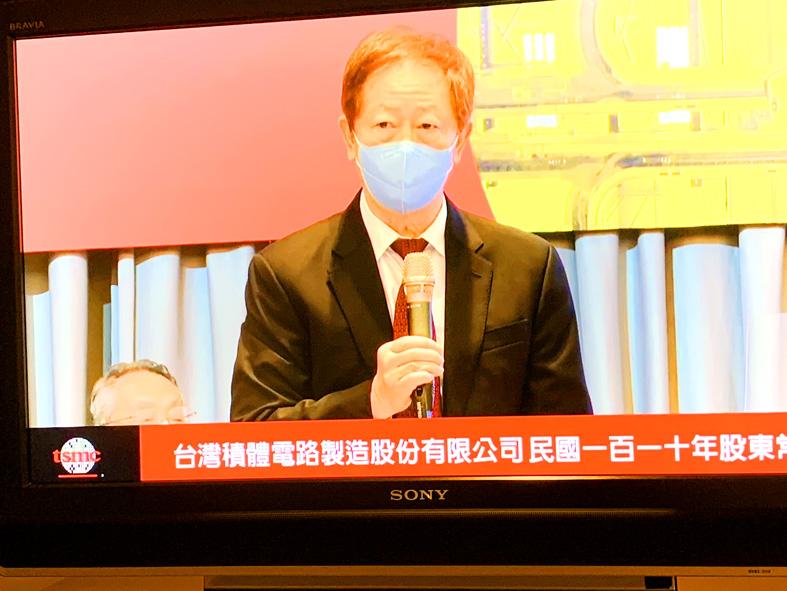Taiwan Semiconductor Manufacturing Co (TSMC, 台積電) is evaluating the feasibility of constructing a semiconductor fabrication plant in Germany as it continues to expand overseas, it said yesterday.
A shareholder at the contract chipmaker’s annual general meeting in Hsinchu City yesterday asked about the possibility following media reports earlier this month that TSMC was approached by the German government about building a chip fab in the country, as Europe joins the US and China in establishing local chip supplies in a bid to avert future chip shortages.
“About the German fab, we are seriously looking into it, but it is still in its infancy,” TSMC chairman Mark Liu (劉德音) told the annual general meeting. “We have close communication with several of our major clients in Germany. We will continue to communicate with them about what would be in the best interest of our clients, but we are still in very early talks.”

Photo: Grace Hung, Taipei Times
The US is to be the first major overseas chip manufacturing site for TSMC, as it started constructing an advanced 12-inch fab in Arizona earlier this year. Using 5-nanometer technology, the fab is expected to start production in the first quarter of 2024.
Japan could be TSMC’s second overseas site, as the chipmaker said that it is carrying out due diligence regarding building a fab there.
“The decision to build a fab in the US and the evaluation of constructing another one in Japan are all based on customer demand,” Liu said. “About 70 percent of TSMC’s business comes from the US.”
The Arizona fab would support demand in the infrastructure and national security segments, although the volume would be relatively small, Liu said.
Addressing shareholder concern over expensive manufacturing costs from overseas fabs diluting the company’s gross margin, Liu said that the expansion is backed by its clients, who are willing to share the cost and help overcome the difficulties.
The chipmaker declined to comment on partnerships with clients, he said, referring to a shareholder’s question about a potential collaboration on fab construction with Sony Corp and German auto chip supplier Infineon Technologies AG.
Manufacturing costs in Japan are much higher than in Taiwan, Liu said, adding that the goal is to balance manufacturing costs between its Japanese and Taiwanese fabs.
The company is confident of reaching its five-year goal of keeping gross margin at 50 percent, Liu said, adding that even now, it is aiming higher than 50 percent.
Shareholders also asked whether Washington’s and Beijing’s plans to build independent semiconductor supply chains could jeopardize TSMC’s business.
Liu said that he was not concerned about the countries’ localization plans, as their semiconductor supply chains would be partial.
The majority of semiconductors used in consumer electronics, such as smartphones, would continue to be made at fabs with cost efficiency, he added.
Revenue for the whole of this year is expected to increase more than 20 percent in US dollar terms, surpassing the global industry average of 17 percent, TSMC chief executive officer C. C. Wei (魏哲家) said.

DIVIDED VIEWS: Although the Fed agreed on holding rates steady, some officials see no rate cuts for this year, while 10 policymakers foresee two or more cuts There are a lot of unknowns about the outlook for the economy and interest rates, but US Federal Reserve Chair Jerome Powell signaled at least one thing seems certain: Higher prices are coming. Fed policymakers voted unanimously to hold interest rates steady at a range of 4.25 percent to 4.50 percent for a fourth straight meeting on Wednesday, as they await clarity on whether tariffs would leave a one-time or more lasting mark on inflation. Powell said it is still unclear how much of the bill would fall on the shoulders of consumers, but he expects to learn more about tariffs

NOT JUSTIFIED: The bank’s governor said there would only be a rate cut if inflation falls below 1.5% and economic conditions deteriorate, which have not been detected The central bank yesterday kept its key interest rates unchanged for a fifth consecutive quarter, aligning with market expectations, while slightly lowering its inflation outlook amid signs of cooling price pressures. The move came after the US Federal Reserve held rates steady overnight, despite pressure from US President Donald Trump to cut borrowing costs. Central bank board members unanimously voted to maintain the discount rate at 2 percent, the secured loan rate at 2.375 percent and the overnight lending rate at 4.25 percent. “We consider the policy decision appropriate, although it suggests tightening leaning after factoring in slackening inflation and stable GDP growth,”

Meta Platforms Inc offered US$100 million bonuses to OpenAI employees in an unsuccessful bid to poach the ChatGPT maker’s talent and strengthen its own generative artificial intelligence (AI) teams, OpenAI CEO Sam Altman has said. Facebook’s parent company — a competitor of OpenAI — also offered “giant” annual salaries exceeding US$100 million to OpenAI staffers, Altman said in an interview on the Uncapped with Jack Altman podcast released on Tuesday. “It is crazy,” Sam Altman told his brother Jack in the interview. “I’m really happy that at least so far none of our best people have decided to take them

As they zigzagged from one machine to another in the searing African sun, the workers were covered in black soot. However, the charcoal they were making is known as “green,” and backers hope it can save impoverished Chad from rampant deforestation. Chad, a vast, landlocked country of 19 million people perched at the crossroads of north and central Africa, is steadily turning to desert. It has lost more than 90 percent of its forest cover since the 1970s, hit by climate change and overexploitation of trees for household uses such as cooking, officials say. “Green charcoal” aims to protect what